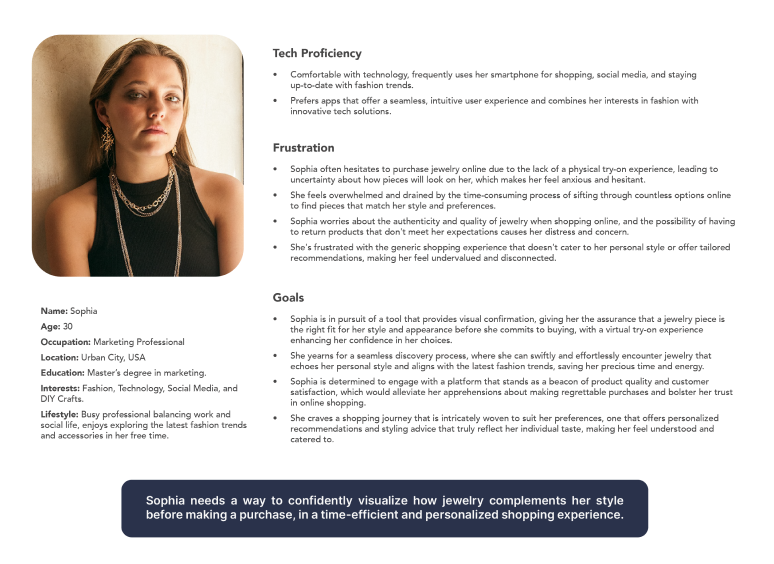Mirra
Mirra is a sophisticated jewelry brand that aims to blend timeless elegance with modern design. The brand caters to individuals who appreciate high-quality craftsmanship and unique, stylish pieces that make a statement.
Mirra is a sophisticated jewelry brand that aims to blend timeless elegance with modern design. The brand caters to individuals who appreciate high-quality craftsmanship and unique, stylish pieces that make a statement.
TYPE
Mobile app design
TIMELINE
08 weeks
ROLE
UI and Visual designer
Jewelry shopping can be intimidating and unsatisfactory for many, due to the inability to try on pieces virtually before purchasing, especially when shopping online. This leads to a high rate of returns and dissatisfied customers.
Mirra delivers a personalized jewelry try-on experience with its AR feature, smart recommendations, and social sharing options, all designed for user engagement and satisfaction.
The ideal audience for a jewelry app includes fashion enthusiasts, influencers, and those passionate about personal adornment, typically adults aged 25-45 with disposable income. They seek a streamlined shopping experience to find the perfect piece to complement their style.
The online jewelry market is expected to grow significantly, driven by the convenience of e-commerce and an increasing preference for personalized shopping experiences. Social media influence and the integration of AR technology are key factors in purchasing decisions, particularly among millennials and Gen Z consumers who value visualization before purchase.
The market hosts a mix of established jewelry brands and emerging tech-focused startups.
Most competitors offer high-quality imagery and customer reviews but lack robust AR try-on features. A few have started integrating virtual try-on, but these are often limited in their user interface and personalization capabilities.
Quantitative: Online surveys distributed through social media platforms targeting fashion and jewelry interest groups to gather data on shopping habits, preferences, and tech usage.
Primary Qualitative: One-on-one interviews with selected participants from the survey who match the persona of our ideal user, aiming to dive deeper into their needs.


Drawing from the empathy map and persona, I identified key user needs and preferences for the Mirra app.
This step was crucial in crafting an empathetic design that meets the varied demands of our target audience, focusing on personalization, ease, and discovery in their jewelry shopping journey.
Problem statement
Despite the growing popularity of online shopping, many consumers like Sophia are hesitant to purchase jewelry online due to the inability to try on items and visualize how they complement personal style and appearance. This limitation leads to a lack of confidence in purchase decisions, resulting in high return rates and dissatisfaction. Consumers crave a more personalized, interactive shopping experience that bridges the gap between the convenience of online shopping and the confidence that comes from an in-store try-on experience.
Value proposition